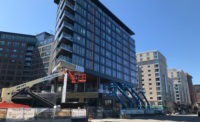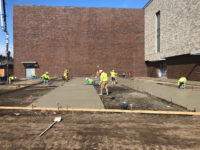Washington Gov. Jay Inslee (D) on March 25 clarified his "Stay Home, Stay Healthy" proclamation from earlier in the week to further restrict construction activity in an effort to combat the spread of the coronavirus in the hard-hit state.
“In general, commercial and residential construction is not authorized under the proclamation because construction is not considered to be an essential activity,” Inslee writes in his updated construction guidance.
Inslee’s order will also suspend most of the operations for the Washington State Dept. of Transportation, except for fish passage work and projects needed for safety issues. WSDOT was originally planning to proceed with all projects, but Inslee stepped in to change that course.
“We think this is more clarity than we had before,” says Dave D’Hondt, executive vice president of AGC of Washington. “Unless it is an essential project per the governor’s order [it is shut down].”
The shutdown is currently scheduled to end April 6, with the option to reevaluate and adjust depending on how the virus progresses.
The governor’s clarifications notes that local governments—which appears to include school districts—have the authority to make determinations about public infrastructure construction within their own jurisdictions, according to D’Hondt. “Before this new guidance from the governor, we had contacted many local governments and most indicated they are proceeding with construction work. This new guidance does not seem to give them any reason to change their minds, but at this point we can’t be definitive with regard to what individual jurisdictions will do,” he adds.
Most private construction work in Seattle will likely come to a halt, as it isn’t deemed “essential” in the governor’s ruling, unless it is a project working on low-income housing or to support an essential service, such as IT infrastructure.
“As best we understand it, for example, data centers would be allowed to proceed, but not necessarily an office building being constructed by a tech company,” D’Hondt says. “There may still be some gray area here, but the main point is that construction can proceed if it supports an essential function of an essential industry, not simply any function.”
Residential construction is stopped, expect for emergency repairs and projects to ensure structural integrity.
For those construction projects continuing because they relate to essential activities described in the order, a government function or facility, or work to address unsafe or emergency conditions at a non-essential business or residential structure, “all construction activity must meet social distancing and appropriate health and worker protection measures before proceeding,” Inslee writes.
Along with the challenge of simply understanding what the order means for specific construction projects, D’Hondt says they’ve already seen challenges with subcontractor availability, largely based on how each individual business interprets the order.
“We are concerned that a number of states have imposed blanket shutdown of operations without an exemption for personnel who support construction activities,” says Michael Oscar, ASA director of government relations, in a statement. “The impact of halting construction activities during this crisis will have a severe effect on infrastructure needs in every state.”
Since construction already has significant safety protocols and separation from the general public in place, workers can safely bring “economic strength” during the crisis, he adds.
Washington state is also experiencing issues with the supply chain. “If a material supplier shuts down because of the order and they supply something on a critical path for a project,” D’Hondt says, “it is going to be a challenge to have those suppliers still supply.”






Post a comment to this article
Report Abusive Comment